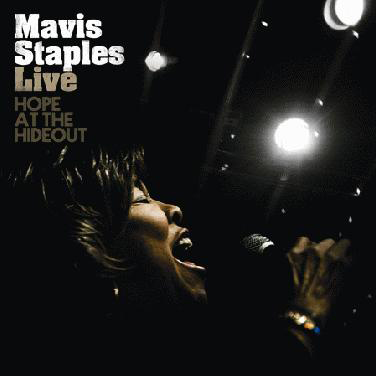"We've come tonight to bring you some joy, some happiness, some inspiration, and some positive vibrations," Chicago's own Mavis Staples begins her latest album, Mavis Staples Live: Hope at the Hideout. With a three piece band and three back-up singers, the disc is over an hour of rollicking gospel and R&B.
Recorded this summer and released on Election Day, this is every bit what live albums should be; raucous, rollicking, and full of the soul a performance veteran and legend can bring. Her repertoire includes gospel songs and the secular, but every note her unique voice goes over sounds like she wants you to get it, to understand, and to hum along. The goal of any singer is to get the crowd involved, to make them feel what they themselves are feeling, and Mavis has years of experience at it. You never get the feeling she's going through the motions or she doesn't take it all seriously.

Production quality on a live album can vary wildly, as the challenges of live sound recording can make a great show in person not translate very well to the LP or to mp3, and this disc is really no different. A kinetic performer, who moves around a bit and not always at the mic full-throat is great for the people in attendance, but not really for the folks on the train listening to the iPod or the Walkman. Mavis moves around quite a bit, judging from some of the tracks, but luckily the levels are up high enough or the microphones positioned in such a way to still pick up enough of her ad-libs and verse exclamations to not hurt the feeling of the songs.
The crowd, at standing room only for the recording session, sounds sparse, though. Perhaps one of the challenges of recording live sound at the Hideout is keeping that small-room feel while emphasizing that a few people in said small room can still get loud and be involved.
One of the beauties of live renditions is that the artist is largely free to re-arrange songs, to approach them differently than previous studio attempts. While this throws off the people who memorized the studio version, it is a joy and delight to hear new directions helmed by the artists themselves. In this facet, the album is a mixed bag. Some live versions sound pretty much exactly as their studio counterparts do, while she seems to take more liberty with the standards, bringing them up tempo and funky. "Down in Mississippi," a studio track from last year's We'll Never Turn Back, sounds pretty much the same, including the same ad-libs and exhortations. "This Little Light," however, is a gospel standard that she amps up and, with the able help of Rick Holmstrom on guitar, makes it rock a little more than usual.
A note about one standard in particular, though. "I'll Take You There" was done as an encore, and she's pretty content to let the audience sing it. This isn't an overly bad thing, but if you're just interested in buying the single track from somewhere online, you may not get what you'd expect when you've listened to a 30 second snippet. "Let me take you there," she calls, and the audience, probably realizing that the show is about to be over but wants to delay the inevitable, nonetheless responds with enthusiasm. "I'll take you there."
Oddly enough, Rick Holmstrom, the man whose creativity on the guitar would warrant more than two solos on the entire album, doesn't get a chance to shine much. I know it's Mavis' album, but when he gets down and funky, it's a welcome diversion and a chance to showcase his skills. With a three piece bad and so much room to improvise, particularly in a live setting, I am somewhat surprised that some soloing wasn't included on the album.
Fans of gospel and of the Staples' extensive catalog probably own this already. Fans of live albums would not do themselves a disservice by picking this album up. What makes a good live album; energy from the performer and the crowd, good acoustics, clear effort from the artist — all comes into play here, and another of Chicago's own grows her legend.
About the Author:
A creative trapped in a techie body, Troy Hunter came to Chicago from Southern Cali for proper schooling. More than 10 years, four worn keyboards, and numerous sheets of Bristol paper later, he's still here. He and his wife reside in Edgewater and coordinate activities at UrbanTherapy.

